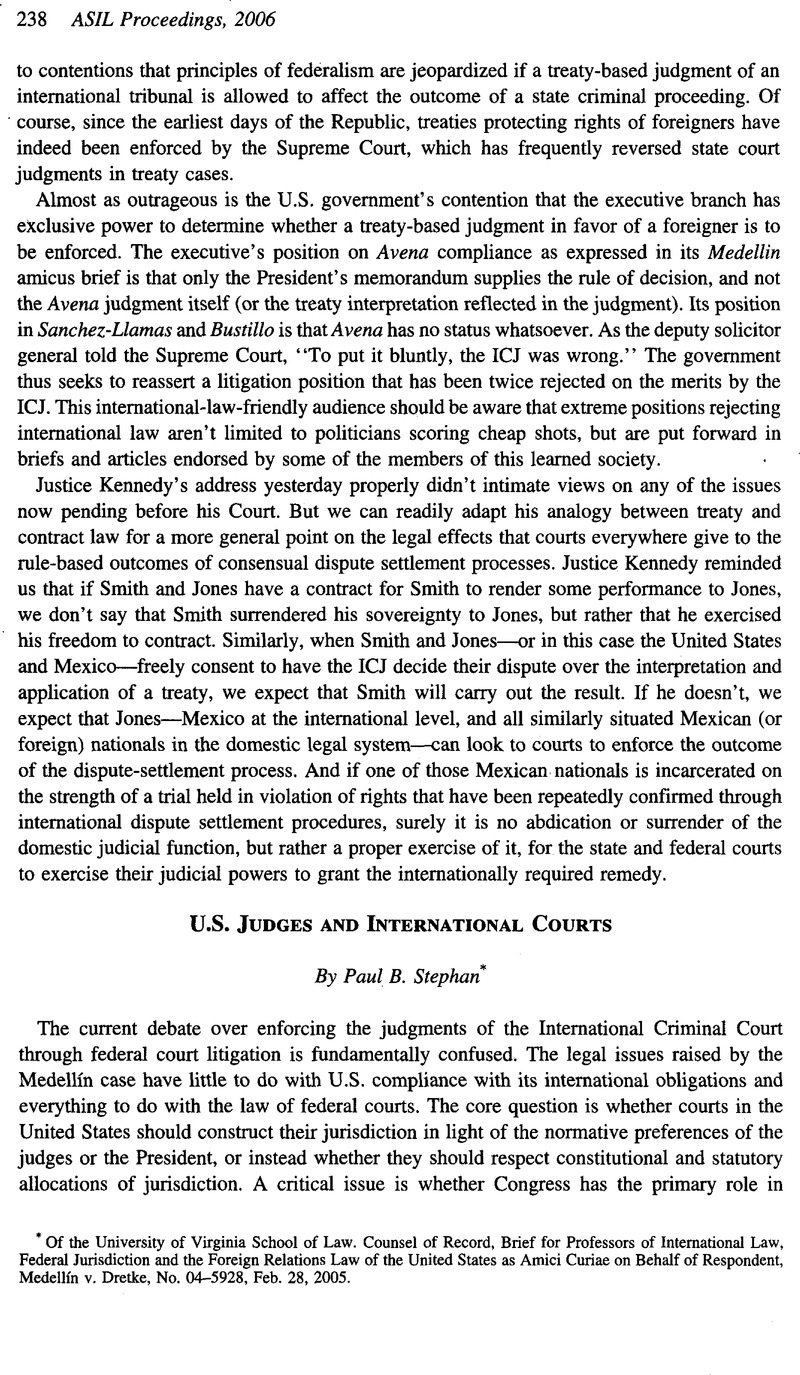No CrossRef data available.
Published online by Cambridge University Press: 28 February 2017

1 28 U.S.C. § 2253(c), as amended by Antiterrorism and Effective Death Penalty Act of 1996.
2 Reed v. Farley, 512 U. S. 339 (1994); Chapman v. Houston Welfare Rights Organization, 411 U.S. 600 (1979).
3 Mansfield, C. & L. M. Ry. Co. v. Swan, 111 U.S. 379 (1884). to be sure, four justices of the Court dissented on this point, but without persuasive reasons.
4 Medellin v. Dretke, 544 U.S. 660 (2005).
5 Breard v. Greene, 523 U.S. 371 (1998).
6 E.g. 9 U.S.C. §§ 201-07 (giving domestic force to commercial arbitration awards based on New York Convention); 22 U.S.C. §§ 1650, 1650a (giving domestic force to arbitral awards under ICSID Convention); 28 U.S.C. § 2414 (specifying conditions under which Attorney General can consent to payment of arbitral awards against the United States).
7 E.g., La Abra Silver Mining Co. v. United States, 175 U.S. 423 (1899); United States v. Blaine, 139 U.S. 306 (1891); United States v. Weld, 127 U.S. 51 (1888); Ailing v. United States, 114 U.S. 562 (1885); Great Western Insurance Co. v. United States, 112 U.S. 193 (1884); Frelinghuysen v. Key, 110 U.S. 63 (1884); Committee of United States Citizens Living in Nicaragua v. Reagan, 859 F.2nd 929 (D.C. Cir. 1988).
8 Ex parte Pera, 318 U.S. 578 (1943). The Foreign Sovereign Immunity Act of 1976, which does not give the Executive any role in determining immunity, now supersedes this practice.
9 American Ins. Ass’n v. Garamendi, 539 U.S. 396 (2003).
10 The standard citation (often misused) is Murray v. The Charming Betsy, 6 U.S. (2 Cranch) 64 (1804). This attitude is discussed and criticized at length in Robert E. Scott & Paul B. Stephan, Limiting Leviathan— Contract Theory and the Enforcement of International Law (2006).
11 Decisions that have recognized limits on the enforcement of statutes include Jackson v. Birmingham Bd. of Ed., 544 U.S. 167 (2005); Gonzaga Univ. v. Doe, 536 U.S. 273 (2002); Corr. Serv. Corp. v. Malesko, 534 U.S. 51 (2001); Alexander v. Sandoval, 532 U.S. 275 (2001).
12 For a particularly influential example, see Mary Ann Glendon, A Nation Under Lawyers (1994).
13 Some cracks in the monolith have emerged recently. in addition to my own work, see Bradley, Curtis A. & Goldsmith, Jack L. Customary International Law as Federal Common Law: A Critique of the Modern Position, 110 Harv. L. Rev. 816 (1997)CrossRefGoogle Scholar; Goodman, Ryan & Jinks, Derek, How to Influence States: Socialization and International Human Rights Law, 54 Duke L.J. 621 (2004)Google Scholar; Heifer, Laurence R. Overlegalizing Human Rights: International Relations Theory and the Commonwealth Caribbean Backlash Against Human Rights Regimes, 102 Colum. L. Rev. 1832 (2002)Google Scholar.